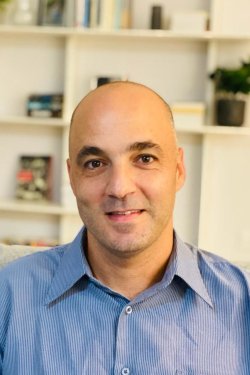Menny Shalom
2022 Israel Award Winner — Faculty

Current Position:
Professor of Chemistry
Institution:
Ben-Gurion University of the Negev
Discipline:
Inorganic & Solid-State Chemistry

Current Position:
Professor of Chemistry
Institution:
Ben-Gurion University of the Negev
Discipline:
Inorganic & Solid-State Chemistry
Recognized for: The development of new types of advanced materials for alternative energy sources. He has devised novel methodologies for the synthesis and study of materials that only contain the elements carbon, nitrogen, phosphorus, sulfur, and boron. These low-cost materials are stable under harsh conditions and can be utilized for applications in photocatalytic and photo-electrochemical reactions and the development of solar cells, batteries, and fuel cells.
Areas of Research Interest and Expertise: Photoelectrochemical Cells, Electrochemistry, Energy Storage, 2D materials, Materials Science
Previous Positions:
BSc in Chemistry, Bar Ilan University, Israel
MSc in Chemistry, Bar Ilan University, Israel
PhD in Chemistry, Bar Ilan University, Israel
Postdoctoral Researcher, Max Planck Institute of Colloids and Interfaces, Germany
Research Group Leader, Max Planck Institute of Colloids and Interfaces, Germany
Research Summary: There are a variety of ways to approach the problem of renewable and sustainable energy production. Major advances in materials synthesis and manufacturing techniques, as well as the sheer need for more energy worldwide, have brought about a rapid increase in the study of photoelectrochemical cells, which are capable of capturing, storing, and releasing energy from sunlight. Menny Shalom, PhD, approaches this difficult problem through the rational design of novel, inexpensive, easily synthesized, and chemically stable materials that contain only the elements carbon, nitrogen, phosphorus, sulfur, and boron (commonly called “CNX” materials, where “X” refers to the nonmetallic elements phosphorus, sulfur or boron). This approach is unconventional in that most new materials being pursued for energy production and storage—including the current state-of-the-art materials, incorporate metal atoms or ions into their architecture.
Shalom has developed a method to construct new CNX materials through a process that involves application of a paste containing carefully selected monomers—individual molecular building blocks that can combine to form polymer chains—onto a surface before removal of residual volatile substances or impurities. After heating, the new material can be analyzed and the original monomer mixture can be fine-tuned to produce desirable properties. Materials developed by Shalom have found uses in a variety of applications including electrochemical water splitting to hydrogen and oxygen, batteries, and photocatalysts—tiny particles that speed up chemical reactions when exposed to light. Through careful analysis of the mechanisms by which CNX materials are made and their resulting behavior, this work will have a significant impact on renewable and sustainable energy production.
“I am very thankful to all my former and current group members and my mentors, for walking with me along this exciting scientific road. I have learned a lot from each one of them. Our goal is to develop new materials for sustainable and renewable energy creation. The research for me is like being a child in a playground and I cannot wait to see the next discoveries!”
Key Publications:
Other Honors:
| 2021 | Tenne Family Prize, Tenne Family and Israel Chemical Society |
| 2020 | Excellent Young Scientist Prize, Israel Chemical Society |
| 2018 | Early Career Research Excellence Award, Israel Vacuum Society |
| 2018 | Toronto Prize for Excellence in Research |